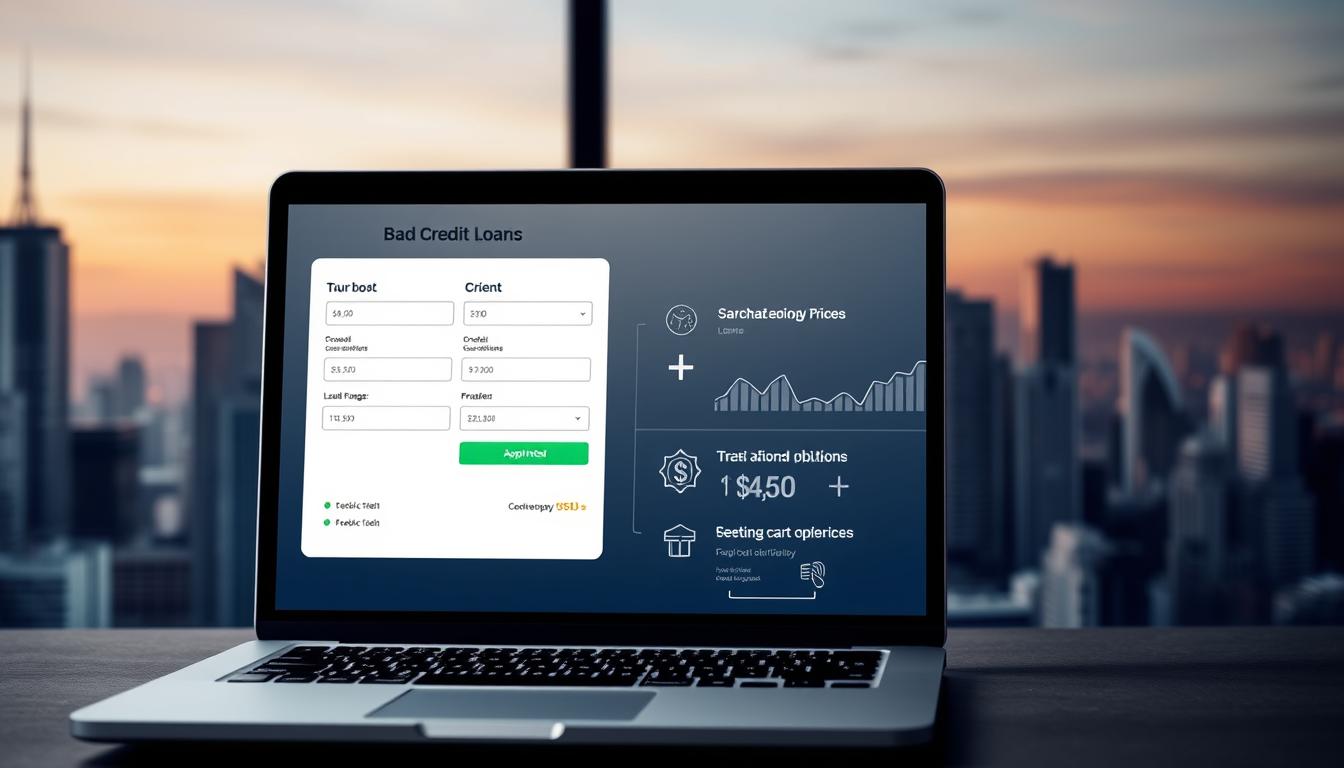Our Guide to Unlocking the Power of an Equity Loan
Buying a home is a big step in life. It also means you have a hidden treasure – the value of your home. Did you know millions of homeowners in the U.S. have a goldmine of home equity? Home equity loans let homeowners borrow a big sum using their home as security. This gives a one-time payout with fixed monthly payments.
Learning how to use your home’s value can open up many financial doors. We’ll look at the different equity loans and how to use them to reach your financial goals.
Key Takeaways
- Home equity loans provide a lump sum amount with fixed monthly payments.
- Homeowners can use their home as collateral to borrow.
- Different types of equity loans cater to various financial needs.
- Effective use of equity loans can help achieve financial goals.
- A home equity loan calculator can help determine borrowing capacity.
What Is an Equity Loan and How Does It Work?
Homeowners often look into different financial options. One choice is an equity loan, which lets you borrow against your home’s value. This loan, also known as a home equity loan or second mortgage, helps you use the equity in your property.
Understanding Home Equity
Home equity is the difference between your home’s current value and what you owe on your mortgage. It’s the part of your home that you actually own. For example, if your home is worth $300,000 and you owe $200,000, you have $100,000 in equity.
The Mechanics of Borrowing Against Your Home
Getting an equity loan means borrowing against your home’s value. There are different types of equity loans, like fixed-rate loans and lines of credit. The amount you can borrow depends on your home’s equity, your credit score, and your income.
Loan-to-Value Ratio Explained
The loan-to-value (LTV) ratio is key in figuring out how much you can borrow. It’s found by dividing your mortgage amount by your home’s value. For instance, if your mortgage is $180,000 on a $300,000 home, your LTV ratio is 60%. Lenders usually have a max LTV ratio for equity loans, between 80% and 90%.
| LTV Ratio | Home Value | Maximum Borrowable Amount |
|---|---|---|
| 80% | $300,000 | $240,000 |
| 85% | $300,000 | $255,000 |
| 90% | $300,000 | $270,000 |
It’s important to understand these points when thinking about an equity loan. Knowing how home equity works and how to borrow against it helps homeowners make smart choices about using their property’s value.
Types of Equity Loans Available in the US
Homeowners in the US have many ways to use their home’s equity. It’s important to know about these options to make the right choice for your financial goals.
Traditional Home Equity Loans
Traditional home equity loans give you a big sum of money upfront. This is good if you need a lot of cash at once.
Fixed-Rate Options
One great thing about these loans is the fixed-rate options. The interest rate stays the same, so your monthly payments won’t change.
Home Equity Lines of Credit (HELOCs)
A HELOC is like a credit card. You get approved for a certain amount of money to use as you need it. This is great for ongoing expenses or big projects.
Draw Period vs. Repayment Period
HELOCs have two main parts: the draw period and the repayment period. During the draw period, you can use the money. In the repayment period, you must pay back the money you borrowed plus interest. Knowing these periods is key to managing your HELOC well.
Cash-Out Refinancing
Cash-out refinancing lets you refinance your mortgage for more than you owe. Then, you get the extra money in cash. This is a good choice if you want to use your home’s equity and maybe get a lower interest rate.
Each equity loan type has its own pros and cons. Knowing about traditional home equity loans, HELOCs, and cash-out refinancing helps homeowners make smart choices about their home’s equity.
The Benefits of Using an Equity Loan
Many homeowners find equity loans appealing because of their benefits. They are a good choice for financing big expenses. Knowing these advantages can be very helpful.
Lower Interest Rates Compared to Other Loans
One key benefit is the lower interest rate compared to other loans. This makes equity loans great for big expenses like home renovations or paying off debt.
Potential Tax Advantages for Americans
Equity loans also have potential tax advantages. The interest you pay can be tax-deductible. This could lower your taxable income.
Access to Larger Loan Amounts
Another plus is the chance to get larger loan amounts. Since your home’s equity secures the loan, lenders often offer more money.
Flexible Repayment Terms
Equity loans also come with flexible repayment terms. Homeowners can pick a repayment plan that fits their budget. An equity loan calculator can help find the best loan and repayment plan.
Potential Risks and Considerations
Understanding the risks of an equity loan is key. Borrowing against your home’s equity is a big decision. Knowing the potential outcomes is crucial.
Your Home as Collateral: Foreclosure Risk
One major risk is foreclosure if you can’t make payments. Your home is used as collateral. If you default, lenders can take your property.
Impact on Your Credit Score
Missing payments can hurt your credit score. This makes getting credit harder later. For more info, check this resource on equity loans.
| Risk | Description | Potential Impact |
|---|---|---|
| Foreclosure Risk | Defaulting on loan payments | Loss of home |
| Credit Score Impact | Missing payments | Reduced credit score |
| Market Fluctuations | Changes in housing market | Potential for reduced equity |
| Closing Costs and Fees | Additional expenses | Increased debt burden |
To avoid these risks, review your equity loan terms carefully. Make sure you can afford the payments. Also, compare lenders to find the best equity loan rates and save money.
Market Fluctuations and Fluctuations
The housing market can change, affecting your home’s value and equity. These changes can impact your borrowing ability.
Closing Costs and Fees
Equity loans often have closing costs and fees. These add to the borrowing cost. Consider these expenses when making your decision.
How to Qualify for an Equity Loan in Today’s Market
To get an equity loan, you need to meet certain financial criteria. Lenders look for financial stability and enough equity in your property.
Credit Score Requirements
A good credit score is key for an equity loan. A score of 700 or higher shows you’ve handled credit well. But, some lenders might accept lower scores if your finances are strong in other ways.
Debt-to-Income Ratio Considerations
Your debt-to-income (DTI) ratio matters a lot. It’s the ratio of your monthly debt to your income. Lenders like a DTI of 36% or less. This means you can handle your debt well, making loan approval more likely.
Home Equity Calculations
Homeowners need enough equity to qualify for a loan. Lenders use the Combined Loan-to-Value (CLTV) ratio to check this.
Combined Loan-to-Value Ratio (CLTV)
The CLTV ratio compares total loans to the property’s value. Lenders want a CLTV of 80% or lower. This means you should have at least 20% equity in your home.
Property Appraisal Process
Lenders often need a professional appraisal to value your property. An appraiser checks the property’s condition and compares it to similar homes. The appraisal cost is usually between $300 to $1,000, based on the location and appraisal details.
Here are the main things you need for an equity loan:
- Good credit score (700+)
- Manageable debt-to-income ratio (36% or less)
- Sufficient home equity (CLTV of 80% or lower)
- Professional property appraisal
Step-by-Step Application Process for Equity Loans
Getting an equity loan might seem hard, but it’s easier when you break it down. We’ll walk you through each step to help you get ready.
Step1: Gathering Necessary Documentation
To begin, you’ll need to collect some important documents. These include:
- Proof of income
- Property deeds or mortgage statements
- Identification documents
Income Verification
It’s key to show you can pay back the loan. You’ll need to provide recent pay stubs, W-2 forms, or tax returns.
Property Information
You’ll need to share details about your property. This includes its market value and any mortgage left to pay. This info helps lenders figure out how much you can borrow.
Step2: Researching and Selecting Lenders
Not all lenders are the same. It’s important to look around and compare them. Think about things like interest rates, loan terms, and fees.
Step3: Submitting Your Application
After picking a lender, you’ll need to send in your application and documents. Make sure everything is right and complete to avoid delays.
Step4: The Underwriting and Approval Timeline
After you apply, the lender will check it and might order an appraisal. This whole process can take a few weeks.
Step5: Closing on Your Equity Loan
If you get approved, you’ll move to closing. Here, you’ll sign the final papers and get your loan money. Always check the terms before signing.

| Step | Description | Timeline |
|---|---|---|
| Gathering Documentation | Collecting necessary documents like income proof and property deeds. | 1-3 days |
| Researching Lenders | Comparing lenders based on interest rates, terms, and fees. | 2-5 days |
| Submitting Application | Sending in your application with required documents. | 1 day |
| Underwriting and Approval | Lender reviews application and appraises property if needed. | 2-4 weeks |
| Closing | Signing final documents and receiving loan funds. | 1-2 weeks |
Finding the Best Equity Loan Rates
Looking for the best equity loan rates is key for homeowners. They want to use their home’s equity. With many lenders offering different rates and terms, it’s important to research well.
Comparing Lenders Effectively
To find top equity loan rates, compare offers from several lenders. Look at traditional banks, credit unions, and online lenders. Don’t just look at the interest rate; also check the loan’s total cost, including fees and repayment terms.
Online tools can help compare rates quickly. They show which lenders offer the best deals. Also, talk directly to lenders to find out about any special deals or discounts.
Fixed vs. Variable Interest Rates
When choosing an equity loan, you’ll see fixed and variable rates. A fixed rate means your payments stay the same. But, a variable rate can change with the market, possibly starting lower but possibly going up.
Negotiating Better Terms
Don’t hesitate to negotiate for better terms on your equity loan. A good credit score and a lot of equity can help you get a better rate.
Shopping around and getting offers from different lenders can also help. This can give you more power to negotiate. Some lenders might offer better deals to win your business.
Current Rate Trends in the US Market
Knowing the current rate trends in the US is crucial for equity loans. Rates change with the economy, so keep an eye on trends. This helps you plan your borrowing better.
Talking to financial advisors or mortgage brokers who know equity loans can be very helpful. They can give you insights into the market. This helps you make a smart choice about when to borrow.
Using an Equity Loan Calculator to Plan Your Borrowing
An equity loan calculator is a great tool for figuring out how much you can borrow and what your monthly payments will be. It helps us make smart choices about our equity loan.
Key Inputs for Accurate Calculations
To get the right numbers from an equity loan calculator, we need to give it some important details. These include:
- The amount we want to borrow
- The interest rate from the lender
- The loan term, or how long we have to pay it back
- The value of our property
Interpreting the Results
After we input the needed information, the calculator will show us our estimated monthly payments and the loan’s total cost. It’s important to look at these numbers closely. This way, we can understand the financial impact of our loan.
Planning for Monthly Payments
Knowing our monthly payment amount helps us plan our budget better. It’s key to make sure these payments are within our budget. This helps avoid any financial problems.
Smart Ways to Use Your Equity Loan
Equity loans are a flexible financial tool for homeowners. They give access to funds for various smart uses. It’s important to choose wisely based on your financial goals.
Home Improvements and Renovations
Financing home improvements with an equity loan is popular. It can increase your home’s value and make your living space better. This can also boost your home’s resale value.
Value-Adding Projects
Projects like kitchen remodels and bathroom upgrades are desirable. They can significantly increase your home’s value. As Quoted by a leading real estate expert, “A well-planned renovation can recoup up to 100% of its cost at resale.”
Debt Consolidation Strategies
Using an equity loan for debt consolidation is smart. It can simplify your finances and save on interest payments. This can be a big help for homeowners.

Education Expenses
Equity loans can also cover education expenses. This is a cost-effective way to invest in your children’s future. It’s a good alternative to other educational financing options.
Emergency Funds and Major Purchases
An emergency fund is essential. An equity loan can provide the needed funds. It’s also good for major purchases that require a big upfront payment.
Business Investment Opportunities
For entrepreneurs, an equity loan can fund business ventures. It allows access to capital that might be hard to get. This can lead to business growth and financial stability.
When looking at an equity loan, find the best equity loan rates. Understand how to get an equity loan that fits your finances. This way, homeowners can make smart choices with their equity loan.
Common Mistakes to Avoid with Equity Loans
When you think about getting an equity loan, knowing the common pitfalls is key. Homeowners often make mistakes with equity loans that can hurt their finances. It’s important to understand how to use this financial tool wisely.
Borrowing More Than You Need
Borrowing more than you need is a big mistake. It can make your monthly payments too high and increase your debt. Always think about what you really need and only borrow that amount.
Ignoring the Fine Print
Another big mistake is ignoring the loan’s terms and conditions. Make sure to read and understand everything, like interest rates, repayment terms, and fees.
Using Equity for Unnecessary Expenses
Using an equity loan for things you don’t really need can cause financial trouble. It’s best to use it for things like home improvements, paying off debt, or big investments.
Not Shopping Around for the Best Terms
Not looking for the best deals from different lenders can mean you get bad terms. Always compare offers to find the best interest rates and terms for your home equity loan. By avoiding these mistakes, you can use your equity loan wisely and reach your financial goals.
Alternatives to Consider Before Getting an Equity Loan
Before you use your home’s equity, look at other financial options. They might meet your needs better or offer better terms.
There are many alternatives to get the financial help you need without using your home’s equity. Let’s look at some:
Personal Loans
Personal loans are a simple way to get money without using your home as collateral. They have fixed interest rates and repayment terms. This makes it easier to plan your monthly payments.
Credit Cards with Promotional Rates
Credit cards with 0% introductory APRs are good for small expenses or short-term needs. But, pay off the balance before the promotional period ends. This avoids high interest rates.
401(k) Loans
Some people borrow from their 401(k) retirement accounts. This gives quick access to funds. But, it’s important to think about the impact on your retirement savings and the loan’s repayment terms.
Saving Instead of Borrowing
Changing your spending habits or saving money might be a better choice than a loan. This option avoids debt and is a healthier financial choice.
Government Assistance Programs
You might be eligible for government programs to help with certain expenses or financial hardships. These programs offer support without needing a loan.
Exploring these alternatives helps you decide if an equity loan is right for you.
Conclusion: Making the Most of Your Home’s Equity
Understanding home equity can be a big help for homeowners in the U.S. Homeowners can use equity loans to reach their financial goals. This includes financing home improvements or paying off debt.
Using home equity well means thinking carefully and planning ahead. We’ve talked about the good and bad sides of equity loans. We also covered how to qualify and apply for them.
By making smart choices, homeowners can get the most out of their home’s equity. This can lead to big benefits like lower interest rates and tax savings.









